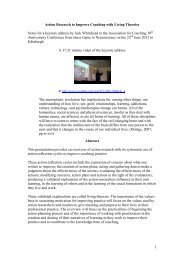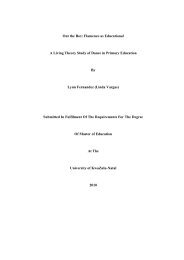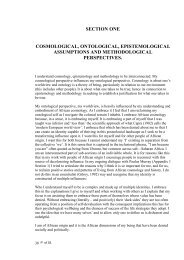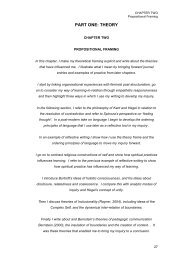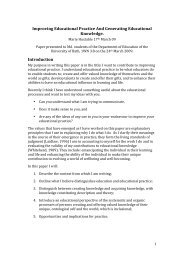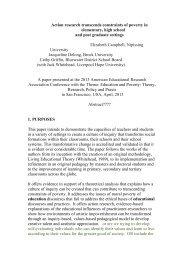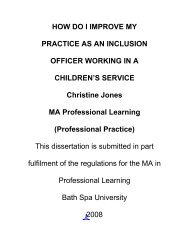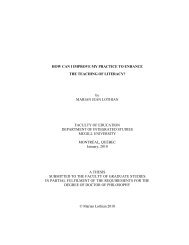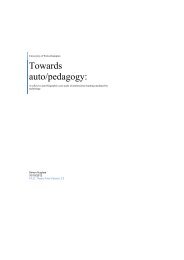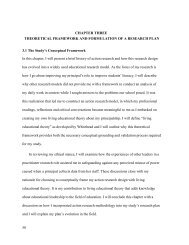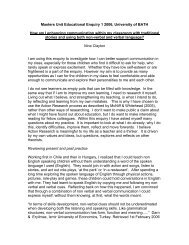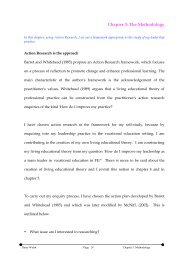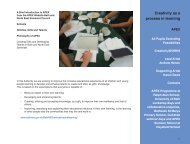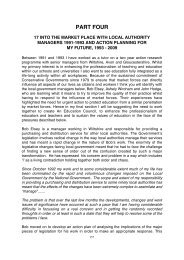How do I contribute to the education of myself and others through ...
How do I contribute to the education of myself and others through ...
How do I contribute to the education of myself and others through ...
You also want an ePaper? Increase the reach of your titles
YUMPU automatically turns print PDFs into web optimized ePapers that Google loves.
Sequence 1 Values in Education1.1 Living <strong>myself</strong> <strong>through</strong> o<strong>the</strong>rsWithin this section I want <strong>to</strong> explain my original contribution <strong>to</strong> knowledge <strong>and</strong> <strong>to</strong>demonstrate how I am drawing on <strong>the</strong> work <strong>of</strong> Thayer-Bacon (1995) in terms <strong>of</strong>underst<strong>and</strong>ing relational epistemology <strong>and</strong> <strong>the</strong> influence <strong>of</strong> this on <strong>the</strong> developmen<strong>to</strong>f my living <strong>education</strong>al <strong>the</strong>ory. I refer <strong>to</strong> <strong>the</strong> work <strong>of</strong> Connelly & Cl<strong>and</strong>inin (1999) interms <strong>of</strong> <strong>the</strong>ir expression <strong>of</strong> ‘s<strong>to</strong>ries <strong>to</strong> live by’ <strong>and</strong> ‘narrative l<strong>and</strong>scapes’ in helpingme <strong>to</strong> explain my st<strong>and</strong>ard <strong>of</strong> judgement. I draw on this <strong>to</strong> reflect <strong>the</strong> importance <strong>of</strong>o<strong>the</strong>rs within my own living <strong>education</strong>al <strong>the</strong>ory (Whitehead, 1989) <strong>and</strong> <strong>to</strong> demonstratemy originality <strong>of</strong> mind in living out my st<strong>and</strong>ard <strong>of</strong> judgment <strong>of</strong> living <strong>myself</strong> <strong>through</strong>o<strong>the</strong>rs. Beyond this, <strong>through</strong> my examples <strong>of</strong> <strong>the</strong> <strong>education</strong>al relationships that I havehad, I want <strong>to</strong> reflect how I account for my own living <strong>education</strong>al <strong>the</strong>ory. I am usingNai<strong>do</strong>o’s (2005) relational sense <strong>of</strong> depending on o<strong>the</strong>rs in order <strong>to</strong> establish self <strong>and</strong>engaging with Pring (2000) in also reflecting <strong>the</strong> importance <strong>of</strong> recognising o<strong>the</strong>rs aspeople <strong>and</strong> human beings. Through engaging with Sartre (2003) I am demonstratingmy ability <strong>to</strong> underst<strong>and</strong> <strong>the</strong> o<strong>the</strong>r <strong>and</strong> acknowledge <strong>the</strong> o<strong>the</strong>r as a person <strong>and</strong>human being. I underst<strong>and</strong> Kincheloe (2003) in terms <strong>of</strong> acknowledging <strong>the</strong>importance <strong>of</strong> experience in contributing <strong>to</strong> <strong>the</strong> debate on <strong>education</strong> <strong>and</strong> <strong>education</strong>alresearch.In terms <strong>of</strong> on<strong>to</strong>logy, <strong>the</strong> debate surrounding <strong>the</strong> nature <strong>of</strong> underst<strong>and</strong>ing <strong>education</strong>; Ibelieve that my approach is associated with <strong>the</strong> view that <strong>the</strong>re is not a truth <strong>to</strong> findbut ra<strong>the</strong>r one that emerges <strong>through</strong> <strong>the</strong> engagement with my own practice. This maybe in contrast <strong>to</strong> a more social science perspective that acknowledges <strong>the</strong> presence<strong>of</strong> an absolute truth that needs <strong>to</strong> be found <strong>through</strong> research. This approach isreflected <strong>through</strong>, for instance, my living metho<strong>do</strong>logy that was not planned inadvance but ra<strong>the</strong>r emerged <strong>through</strong> time <strong>and</strong> experience. My on<strong>to</strong>logical approachis rooted within relational epistemology due <strong>to</strong> <strong>the</strong> fact that I believe <strong>the</strong> ‘truth’ that Ifind will be as a result <strong>of</strong> <strong>the</strong> interactions that I have <strong>through</strong> <strong>the</strong> journey that I amundertaking.In terms <strong>of</strong> epistemology, <strong>the</strong> debate <strong>to</strong> underst<strong>and</strong>ing knowledge; it is my approach,an anti-positivist approach, <strong>to</strong> acknowledge <strong>the</strong> value <strong>of</strong> living <strong>through</strong> experiences inorder <strong>to</strong> fully underst<strong>and</strong> <strong>the</strong>m as opposed <strong>to</strong> a more traditional, positivist view <strong>of</strong>being able <strong>to</strong> research from a distance upon a subject that may be unfamiliar. Thisliving <strong>through</strong> <strong>of</strong> experiences again reinforces my relational epistemology in terms <strong>of</strong>constructing events as <strong>the</strong>y happen from <strong>the</strong> experiences that I have, <strong>through</strong>24



